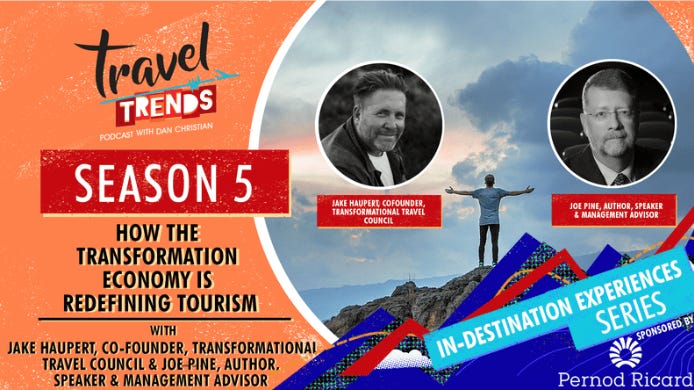How the Transformation Economy Is Redefining Tourism
The Travel Trends Podcast with Me and Jake Haupert
I had the pleasure of appearing on the season finale of this year’s Travel Trends Podcast, hosted by Dan Christian along with Jake Haupert, founder of The Transformational Travel Council. Jake also cofounded Explorer X, a travel design company I featured as an exemplar for encapsulation in my post on how to turn any experience into a transformative experience (which will be in Chapter 4 of the book).
You can access the podcast here (with links to the usual players):
It really is about “How the Transformation Economy Is Redefining Tourism”. As the show notes put it:
Transformational travel stands apart from traditional tourism. It’s not about fleeting moments or checking off bucket-list destinations. Instead, it’s a holistic journey that unfolds in three essential phases: intentional preparation, immersive experiences, and meaningful reflection. Without this complete arc, the potential for lasting change often fades once travelers return home.
Joe and Jake argue that transformation is the missing link between the ideals of sustainable tourism and real behavioral change. It’s a pathway to deeper connections - with ourselves, with others, and with the natural world.
One of my favorite podcasts of the year, Dan asked great questions of Jake and I, and we bounced off each other to explore what this forthcoming shift from the Experience Economy to the Transformation Economy means for the biggest industry in the world, travel & tourism. (Not just biggest experience industry – the biggest industry period in terms of number of people employed across the world!)
Listen (1) because you are a traveler, and (2) for what you can learn from the industry
But don’t feel like you must work in the travel industry to listen in. First of all, you are a traveler, so pay attention to how you can turn your own travel experiences into awe-inspiring transformations. Secondly, you can learn from what travel companies are doing to impact your own business. I’ve long said that people shouldn’t practice best practices – copying what someone else is doing. Rather, practice best principles. As I put it in a Strategic Horizons Thoughts Post:
Do not approach exemplars – not just of the Experience Economy, but of anything in the business world – from the standpoint of “best practices”.
For examining best practices aims to see what others are doing well and copy them, which seldom really works. Plus, copying, by definition, never yields innovation!
Instead, seek out best principles. Yes, examine what others are accomplishing, but do so in order to extract out the principles they are deploying in their industry, their situation, and their circumstances.
Then look at your own industry, situation, and circumstances to see how those same principles could be put to work in creating greater economic value for your business.
And there is again much to learn from the travel industry, which is why I lead off Chapter 4 of the book – and in this exemplar post – with how its shifts over time exemplify the Progression of Economic Value.
But if you are in the travel industry, note that Arival, an insights company that “advances the business of creating amazing in-destination experiences”, has invited me to its annual Arival 360 event in Washington, DC, September 30-October 3. I’ll be doing a keynote on the Transformation Economy at the general session on the 1st of October and will also be on a panel discussion in the preceding Executive Forum on September 29, as well as facilitate some of the discussion executives have together, as will with my colleagues Dave Norton and Aransas Savas at Stone Mantel, the Experience Strategy Company.
Joe
P.S. I precede these appearances at Arival 360 with a speech in Phoenix and then several sessions in Manila, Philippines, before arriving in DC, so this 10-day tour might give me my own travel experience to talk about. . . .
© 2025 B. Joseph Pine II



